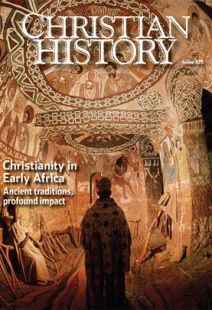Breaking bread for the church
WHEN AUGUSTINE OF HIPPO (354–386) is studied in universities and seminaries, it is most often as Augustine the philosopher or Augustine the theologian. But what about Augustine the pastor? Without a doubt, the African church leader was one of the greatest thinkers in Christian history. However, his “day job” for nearly 40 years was serving first as priest and then bishop in the church at Hippo Regius (modern Annaba, Algeria) in North Africa.
When the bishop calls
In 391 Augustine traveled from his hometown of Tagaste (modern Souk Ahras, Algeria), where he had established a type of monastery, to Hippo, where he considered establishing another. Having only been a baptized Christian for around four years, Augustine did not appear to be on a path toward ordained ministry. But when Augustine visited the church at Hippo, its bishop, the aging Valerius, challenged him to put his gifts of teaching and communicating to work and become a priest. Accepting the challenge, Augustine quickly entered into this new ministry.
As priest and bishop, Augustine’s primary task was preaching. Unraveling difficult texts through the aid of allegory and communicating with the skills of a trained orator, Augustine may have preached as many as 10,000 sermons in his lifetime. Likening this work to breaking bread for the church, he declared to his people, “I feed you on what I am fed on myself . . . I set food before you from the pantry which I too live on.”
Community engagement was also important. According to Roman law, bishops were expected to serve as judges and mediators in the courts. Though Augustine expressed frustration at how much time this took, he accepted the role so that he could apply Christian understandings in the public square.
Pastor to pastors
Augustine also participated in African church councils that shaped churchly practices and doctrine. He was the key voice in as many as 22 of these gatherings. Finally, through letters, personal visits, and mentoring church leaders in the monastery at Hippo, Augustine served effectively as a pastor to other African pastors.
A large element of Augustine’s ministry was a commitment to community. When he was struggling to come to faith, he learned from Simplicianus and Ambrose (ca. 340–397), church leaders in Milan. After his conversion and call to ministry, he initiated monastic communities where communal prayer, shared meals, Scripture study, and spiritual accountability shaped Christians’ life together. In the context of church ministry and church councils, his disciples worked alongside him and learned from his example.
Today’s leaders can learn from this to be intentional about pursuing authentic community. Every Christian leader should seek out a mentor and be transparent about the spiritual life, including personal sin and the painful burdens of ministry. Every leader should have a friend like Alypius—Augustine’s lifelong friend and bishop of Tagaste—whom Augustine affectionately called “my heart’s brother.” CH
By Ed Smither
[Christian History originally published this article in Christian History Issue #105 in 2013]
Ed Smither is professor of intercultural studies at Columbia International University and author of Augustine as Mentor: A Model for Preparing Spiritual Leaders.Next articles
And some others you should know . . .
The African church gave Christianity leaders, theologians, martyrs, and its share of controversies
Michael GlerupTelling the African story
A conversation between Christian History and Thomas Oden of the Center for Early African Christianity on how Africa formed early Christian teaching
Thomas Oden and the EditorsNorth Africa: Recommended resources
Here are a few books, websites, and past CHM issues recommended by Christian History staff and this issue’s authors as guides to the landscape of early African Christianity
the EditorsIndustrialization, Did you know?
The Industrial Revolution replaced human skills with machine skills all over Europe and America
the Editors



